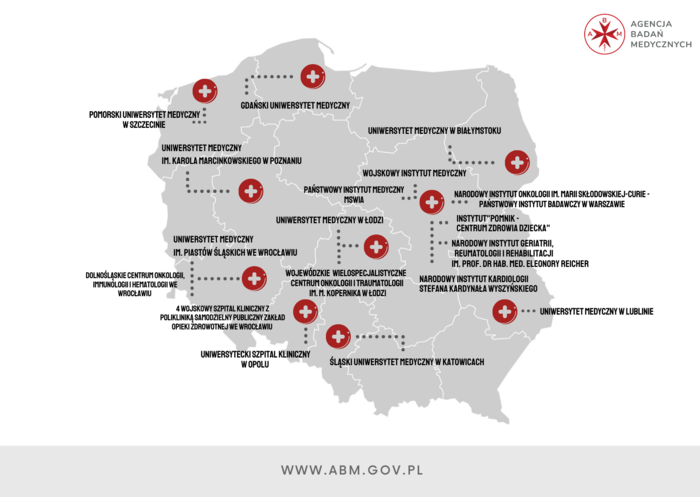The MUG with funding for the Interdisciplinary Pomeranian Centre for Digital Medicine
20.09.2023
Over 24 million 115 thousand PLN of funding from the Medical Research Agency (MRA) will be received by the Medical University of Gdańsk for the creation of the Interdisciplinary Pomeranian Centre for Digital Medicine. The project will be implemented by a consortium led by the MUG, and partners: the University Clinical Centre in Gdańsk, the Silesian University of Technology in Katowice and the University of Gdańsk. Thanks to the allocated funds amounting to half a billion PLN, 18 units from all over Poland will create infrastructure enabling access to a large amount of reliable data, while maintaining control over the sources that generate it.
As emphasized by the Medical Research Agency, the creation of Regional Centres for Digital Medicine will contribute to the development of IT solutions in the field of digital medicine enabling the analysis of medical data and tools facilitating the work of doctors. This will translate into improved effectiveness of patient treatment and their access to innovative therapies, which will ultimately help meet the health needs of society and eliminate barriers currently existing in the medical care system. Access to modern digital health infrastructure is essential to improving the way patient care is delivered across the European Union. In a rapidly changing world, the free flow of scientific data is crucial to ensuring the health of Europe’s population and preparing for new health challenges.

Interdisciplinary Pomeranian Centre for Digital Medicine
The establishment of the Interdisciplinary Pomeranian Centre for Digital Medicine (IP_CMC) at the Medical University of Gdańsk is an opportunity to improve and intensify scientific research in the field of medicine through the use of IT solutions enabling the availability of data in electronic form and tools for their automatic analysis, aggregation and processing into a useful form for a specific research project. This will not only allow for obtaining valuable information on the basis of which the researcher is able to prove scientific theses, but also for building artificial intelligence algorithms as a result of the use of advanced machine learning techniques. This will enable the identification of new, unknown patterns and trends, automatic segmentation of cases (research, diagnostic, etc.), automatic recognition of patterns (e.g. pathological places, tumors, etc.) in images and other effects that have not been achieved so far.
The establishment of the Centre will enable a significant and lasting increase in the scientific potential of the MUG and project partners. It will be implemented by: enabling the transfer of anonymized and encrypted clinical data from the hospital HIS system to a secure analytical system, available to authorized researchers. The prototype of the system called Data Bus was used on a pilot basis to answer queries about clinical data for over 400 patients as part of three research projects. It will be expanded into a secure, central data warehouse.
Through the implementation of the project, the infrastructure of the Central Biobank of the MUG will be expanded, which will improve the efficiency of collecting and sharing samples of biological material. The resources of the Centre of Biostatistics and Bioinformatics Analysis, which was created as part of the project Excellence Initiative – Research University and the Multidisciplinary Clinical Research Support Center MUG-UCC-UDC. This will enable more effective support and biostatistical support for clinical trials conducted by our University. In addition, stable and reliable diagnostic protocols will be created for the Division of Biology and Medical Genetics of the Medical University of Gdańsk.
The availability of large sets of high-quality data will become a catalyst for MUG’s research activities. The scope of data provided by IP_CMC includes, among others: imaging and demographic data of UCC’s patients, omics data obtained from samples undergoing biobanking, as well as from scientific research carried out at the MUG, including clinical, population and genetic studies. The diversity of data makes their integration and standardization one of the most important goals of the Centre.
Data Warehouse
The size of the data volume requires large memory resources and an efficient IT system that will make the data available in a timely manner automated and in a short time. The response to this need is a data warehouse, which will be a key technological element in the Interdisciplinary Pomeranian Centre for Digital Medicine. The IT solution based on a data warehouse will be complemented with IT tools for data exploration, analysis and processing for the needs of research projects and a solution automating the logistics related to access to data.
In addition, procedures, standards and IT solutions will be developed to ensure the security of processed data and information and the continuity of system operation, including broadly understood IT Governance and Data Governance. The main goal of the project is to create infrastructure (structured, image, sequence and text data warehouse; ICT infrastructure), tools (IT systems) and organization (staff, organizational structure, processes, procedures, standards, premises) supporting the implementation of scientific research in the field of medicine digital at MUG and in cooperation with other research units.
The full list of beneficiaries is available on the Polish-language MRA’s website.
photo by MRA